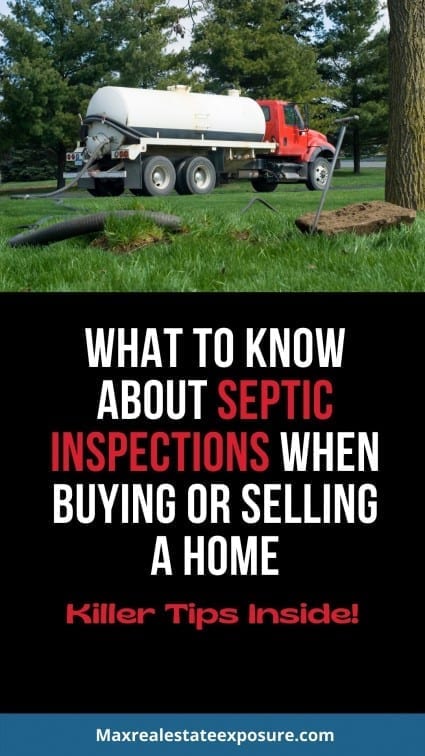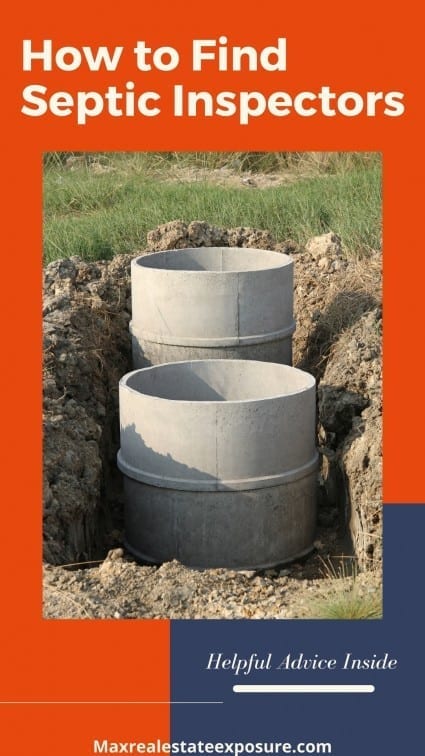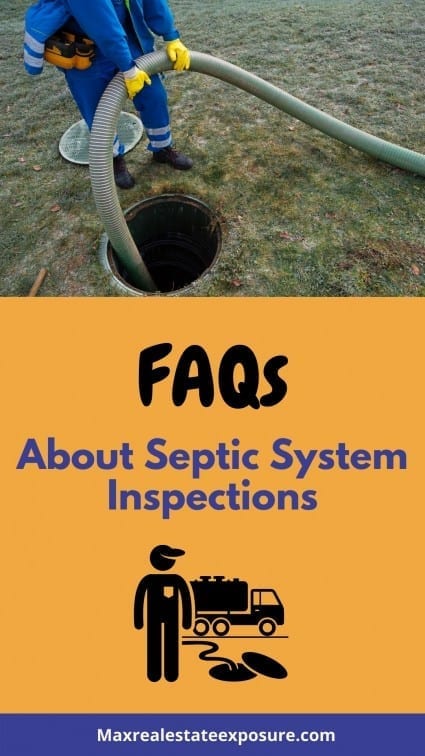What to Know About Septic Inspections
 Are you wondering how septic inspections work? If you are buying a home with a septic tank, there are some things you need to be aware of. If you sell your home, you could need a septic system inspection.
Are you wondering how septic inspections work? If you are buying a home with a septic tank, there are some things you need to be aware of. If you sell your home, you could need a septic system inspection.
For example, here in my home state of Massachusetts, we have a law known as Title V that a seller must have their septic system inspected by a septic inspector upon the transfer of real estate.
Septic inspectors must be licensed in many states, so you can’t just have anyone do a septic inspection. Of course, as a property owner serviced by a septic system, it is vital to have proper maintenance so there are no issues now or when it comes time to sell the home.
In some states, a septic inspection is a big hurdle to clear in a real estate transaction.
Let’s examine why septic inspections are essential and what you need to know about them. Both buyers and sellers should have a firm grasp of how septic inspections work.
What is a Septic System?
Before we work through what you need to know about a septic inspection, it will be essential to have at least a basic understanding of what a septic system is and how it works.
Most septic systems contain a septic tank, a distribution box, and a leach field. People also refer to a leach field as a drain field. Septic tanks assist in digesting organic matter and will separate floatable matter such as oil, grease, and solids from the wastewater.
A septic system that is functioning correctly will discharge the liquid from the septic tank to a distribution box to perforated pipes that are buried in a leach field. The lines are designed to release the effluent into the ground slowly.
Septic tanks have been in use since the late 1800s. A septic tank, however, did not become more commonly used until the 1960s. Before that time, a cesspool or cesspit was the most common type of waste removal.
Why Having a Septic Inspection is Important
So, what is a septic system inspection? A septic tank inspection is vital to buying a home with this type of wastewater treatment system. Septic inspections ensure the system operates as it should so that you and your family don’t get sick, thanks to a leak or other problems.
Since these types of water treatment systems are located underground, a septic inspection is something that homeowners easily overlook. However, if something goes wrong, you will regret not having septic inspectors check your system regularly.
It isn’t only when you are looking to buy a home that septic inspections are needed. An inspection should be done when you own the home. Otherwise, you could find an expensive repair bill for this vital system in your home.
Septic tank maintenance is a crucial part of homeownership. Lack of care can lead to expensive bills.
Who Has Septic Systems?
Around a fifth of homes have septic systems installed to deal with their wastewater, but despite this, many home buyers won’t have encountered them before. Most homeowners have lived with public sewers, so having a septic system can be somewhat of an anomaly.
Septic tanks are used to deal with all the wastewater from the home. This includes water from sinks, bathtubs, showers, toilets, and appliances. As mentioned previously, this water is filtered through what’s known as a leach field and returned to the ground.
Septic systems minimize the chances of water and soil pollution when working correctly.
How Septic Tank Systems Work
 The wastewater from the bathrooms and the kitchen leaves the home going to the septic tank. The waste and water separate in the tank, with the solids sinking to the bottom. This will then be broken down by bacteria gradually.
The wastewater from the bathrooms and the kitchen leaves the home going to the septic tank. The waste and water separate in the tank, with the solids sinking to the bottom. This will then be broken down by bacteria gradually.
The water at the top of the tank will go through pipes to the drain field or leach field. This contains gravel that filters the water before it enters the soil. The soil helps filter the water further, ensuring it isn’t contaminated when it reaches the groundwater level.
Many septic systems also use what is referred to as a distribution box.
The distribution box helps the water flow out to the leach bed in the yard.
Three Main Components of a Septic System
The three main components of a working septic system are as follows:
- Septic tank
- Distribution box
- Leach field
You could have issues without any of these septic system components functioning correctly. Some can be pretty minor to correct, such as a cracked cover on a septic tank.
Big money comes in when you have to replace a leach field. When a leach field fails, you’ll be looking at big bucks to fix it.
Look at what to know about the cost of replacing a septic system. After seeing how costly replacing a septic system or tank is, you will realize how crucial proper maintenance can be.
How Often is a Septic Tank Inspection Required?
To ensure your septic system is functioning perfectly, inspect it every 3 to 5 years. This is about the same schedule you will need to keep when having the tank pumped.
Septic tank pumping is a vital part of maintenance. Fortunately, the cost of septic tank pumping is minimal, given the expense you will face with a failed system.
If you stick to a schedule like this, your septic tank should continue to work well for the system’s life. If you have a large family, you may want to consider it slightly more often.
Unfortunately, many homeowners don’t stick to a schedule like this—missing septic inspections and not having the tank pumped as frequently as possible. The result tends to be that something goes wrong with the system, and only then the homeowner calls the septic inspector.
However, at that stage, the inspector will likely recommend repair work or replacement of system parts. When this happens, the costs will be much more than the expense of maintaining the system correctly.
A complete septic system replacement can run from around $10,000 to $50,000 on average. These costs can increase based on terrain, existing soils, groundwater, and installation difficulty. Septic systems are much less expensive when the groundwater is not high, and the ground is gravel and not clay.
These costs can often be avoided with pumping and septic inspections being carried out regularly. Correct maintenance will also prevent any nasty faults from developing and should make your home easier to sell when the time comes.
Septic Inspection Near Me
 You may be wondering how to find a septic system inspector nearby. If you are working with a real estate agent, you should be able to get a recommendation from a qualified septic inspector. If you sell for sale by owner, you can contact Google for septic inspectors nearby.
You may be wondering how to find a septic system inspector nearby. If you are working with a real estate agent, you should be able to get a recommendation from a qualified septic inspector. If you sell for sale by owner, you can contact Google for septic inspectors nearby.
I would recommend septic inspection near me, septic tank inspection near me, or septic inspectors near me. There should be multiple results of who can do a septic tank inspection.
The Two Types of Septic Inspections
Visual Inspection
A home inspector will generally complete a visual inspection of the system. This will include checking the age of the system and maintenance history.
The inspector will also test the system by flushing toilets and turning on faucets to ensure the pressure is good enough. This will also show that the septic system can handle the water correctly.
Visual checks will also be made on the drain field. They are looking for standing water, which means the drain field could need replacement.
While all this indicates the system’s health, it isn’t going to give a full indication of its reliability. To find that out, a full inspection is needed.
Full Inspection
A full septic tank inspection will do all the above and go further. This type of inspection will involve opening up the cover on the tank to check the level, and that water is flowing from the house as it should. Sometimes, a dye will show how much enters the tank.
If any water flows back into the tank from the drain field, this will be discovered after the tank has been drained. All of these tests will ensure that there aren’t any blockages in the system and that each stage of the process is working as it should.
If water above the pipe leaves the distribution box, it is a sign that the leach field is no longer functioning as it should. You could be looking at a septic system replacement.
How a Septic Inspector Will Locate Your Septic Tank
There are a few ways to help determine the location of your septic tank and the rest of your septic system components. You can locate your system as follows:
- Get the septic system “as-built” from the local board of health. The as-built plan shows the exact location of the design on your lot.
- An inspector will use a metal rod to probe the yard for the potential location of the septic tank.
- Some septic inspectors use a metal detector if they have problems finding the tank.
- Locate an area in the lawn where the grass is much greener than everywhere else.
- As a last resort, septic inspectors will flush a small radio transmitter into a toilet, eventually landing in the septic system.
What Does a Septic Inspection Cost?
The cost of a septic inspection will vary depending on a few factors. The tank size affects the price, as does the qualifications and licensing required by the inspector.
In some states, like Texas, licenses aren’t needed, so your costs should be lower. However, it can mean that the inspector doesn’t have the qualifications to spot a problem with your system.
You can expect average septic inspection prices to range from around $300 to over $1000. You could find that your local health department offers inspections at lower costs if this seems too high.
It is essential to note that if the property has private water, a well inspection should be conducted. You want to ensure the well has a clean bill of health, as contamination from a septic system is always possible.
Symptoms of Problems With Your Septic System
 A few things indicate your system needs some money spent on it to keep it working.
A few things indicate your system needs some money spent on it to keep it working.
Puddles
If you find that puddles develop above your septic system or drain field, this can be an indication of a blockage or worse. This puddle could be wastewater, so make sure your family stays away from it. An inspector can tell you if there is a problem with the system and what will need to be repaired.
Green Grass
If the grass is greener over the septic system than elsewhere in your yard, it could be a sign of problems. If the drain field or the tank isn’t working as intended, it could result in more water entering the ground.
While this might benefit your plants and grass, it isn’t suitable for people and indicates repairs are needed.
Plumbing Backups
If the water doesn’t drain away as it should, it could be caused by a blockage, which might be a simple fix or worse. It could indicate that the tank needs replacement, and your septic inspectors will find the answer.
Strong Septic Tank Odors
If your yard has an awful odor, the cause could be related to your septic system. A septic inspection will assess whether the strong scents you smell are coming from the system.
Making Your Septic Tank Last Longer
If you avoid flushing things that won’t break down in the tank, this will help it last. Paper towels, baby wipes, and tampons should be disposed of another way.
Medications, chemicals, and anti-freeze don’t help your tank’s functioning. Avoid putting these down your drain, as they can destroy the bacteria in your tank.
Bleach can be put into a tank, but only in small amounts. It would help if you tried buying laundry detergent designed to be used with septic systems.
Building a Home Where Septic System Installation is Required
If you buy a piece of land without public sewer, you must have a septic system installed. If you are getting a construction loan, the lender will require seeing a certificate of compliance from the local board of health stating that the system passes the required standards.
When buying land where a septic system is needed, it will be crucial to have a property survey for proper placement. Some cities and towns will have minimum distance requirements on where a septic system can be placed to the house and other structures such as pools.
Buying over an acre of land is usually less problematic unless the parcel is constrained by wetlands or ledge. Purchasing a piece of land serviced by a septic system can be more challenging because you need to verify that a system can be installed on the property.
The cost of a land survey is worth the expense of ensuring everything is done correctly.
Ensuring you are not overpaying for the land will also be essential. If the septic system installation is an extraordinary expense, this should impact what you will pay for the land. It will be crucial to run comps to determine what other properties are selling for.
Buying a Home With a Septic System
If you purchase a property with a septic system, you should learn a few things about it and its maintenance. Knowing how old the home is and when the system was last inspected or pumped will help you see if there are more likely problems.
Other questions should include if there has been any standing water near or above the tank and problems with backups. Also, find out about any repairs made to the tank and when.
You will want to hire a septic inspector to ensure the system functions correctly. Spending the money on this type of inspection should ensure you don’t get surprised by a large bill soon after you’ve moved in.
In states where septic inspections are required, there will often be a contingency in the real estate contract between the buyer and seller. If the septic system inspection does not pass, the buyer can get their earnest money back.
When buying a home with a septic system, it is vital to have a licensed septic inspector look over the system!Click To TweetSelling a Home With a Septic System
When selling, you might need a septic inspection before the sale. Some states need sellers to have reviews before a deal, and others don’t. Check with your state’s health department or local real estate agent if you are unsure of the requirements.
If you know of a problem with your system and don’t disclose it to the buyer, you could be in for legal trouble. In many states, real estate disclosure laws require informing the buyer of problems you know about. Failure to do so could lead to a lawsuit.
If problems are discovered with the septic system in selling your home, the costs will likely be your responsibility. However, this can be negotiated with the buyer.
Frequently Asked Questions About Septic Inspections
 1. What is done during a septic inspection?
1. What is done during a septic inspection?
There are three things a septic system inspector will check during an inspection, including the integrity of the septic tank, the proper function of the distribution box, and a leach field that is working as intended.
If all three components work correctly, you will have passed the septic inspection.
A septic inspector will open the septic tank and look around visually. Most of the time, they will pump the tank unless it has been done recently. The inspector will also open up the distribution box and check to see that it’s functioning as intended.
2. How much does it cost to inspect a septic system?
The cost of inspecting a septic system will vary depending on a few factors, including your location. Pricing will vary from state to state.
The tank size, generally 1000 or 1500 gallons, will also bear the cost, as septic inspectors will typically pump the tank as part of the inspection.
You can expect to pay anywhere from a few hundred dollars to a little over $1000. When a septic inspector has to bring in equipment to get to a septic tank, the price will increase.
3. Who pays for septic system repairs, the buyer or the seller?
In most states, the seller will be responsible for repairing any issues found during a septic inspection. In Massachusetts, you cannot sell a home without a passing review.
4. How long do septic systems last?
On average, a septic system will last from twenty to fifty years. Being a real estate agent, I have seen septic systems fail sooner and last longer. If you take care of your system, it will last longer.
It is recommended not to have a garbage disposal with a septic system, as it can cut years of life off the system. Solids in the tank can end up in the leach field, eventually causing it to fail.
5. Are septic inspections required for FHA and VA loans?
With a VA loan, no specific septic system inspection requirements exist. However, the VA requires an appraiser to verify the system is functioning correctly at the time of sale.
The FHA requires the septic system to function correctly under local ordinances. An appraiser would also need to verify during their visit to the home that the septic system is working as intended.
6. What happens if a septic system fails during a home sale?
In most states, one of two things needs to happen. Either the seller will need to replace the system, or the buyer’s lender will need to allow an escrow holdback for replacement. When you do an escrow holdback and close as planned, the lender will require a holdback of 1.5 times the replacement cost.
So, if the septic system costs $20,000 to replace, the lender will require a seller to have $30,000 of their proceeds held in escrow. The seller will get these funds back when the septic system has been installed and the local board of health signs off on approval.
Conclusions on Septic Inspections
Usually, septic systems are efficient when adequately maintained. They can last 25 years or longer without replacement if inspected and pumped regularly. You can prolong the life of your system by avoiding putting hazardous chemicals or non-biodegradable items down your drains.
Hopefully, you have learned a ton from our guide to septic inspections and adequately keeping up with your system.
About the Author: The above Real Estate information on what to know about septic inspections was provided by Bill Gassett, a Nationally recognized leader in his field. Bill has expertise in mortgages, financing, moving, home improvement, and general real estate.
Learn more about Bill Gassett and the publications he has been featured in. Bill can be reached via email at billgassett@remaxexec.com or by phone at 508-625-0191. Bill has helped people move in and out of Metrowest towns for the last 37+ years.
Are you thinking of selling your home? I am passionate about real estate and love sharing my marketing expertise!
I service Real Estate Sales in the following Metrowest MA towns: Ashland, Bellingham, Douglas, Framingham, Franklin, Grafton, Holliston, Hopkinton, Hopedale, Medway, Mendon, Milford, Millbury, Millville, Natick, Northborough, Northbridge, Shrewsbury, Southborough, Sutton, Wayland, Westborough, Whitinsville, Worcester, Upton, and Uxbridge MA.


 1. What is done during a septic inspection?
1. What is done during a septic inspection?
Thanks for pointing out the typical cost of a septic tank inspection after it has been installed. I will be hiring a septic tank installation service when my new home gets built soon so I’d like to make sure that I can maintain it well. Getting regular inspections and maintenance will surely help in avoiding costly repairs in the future.